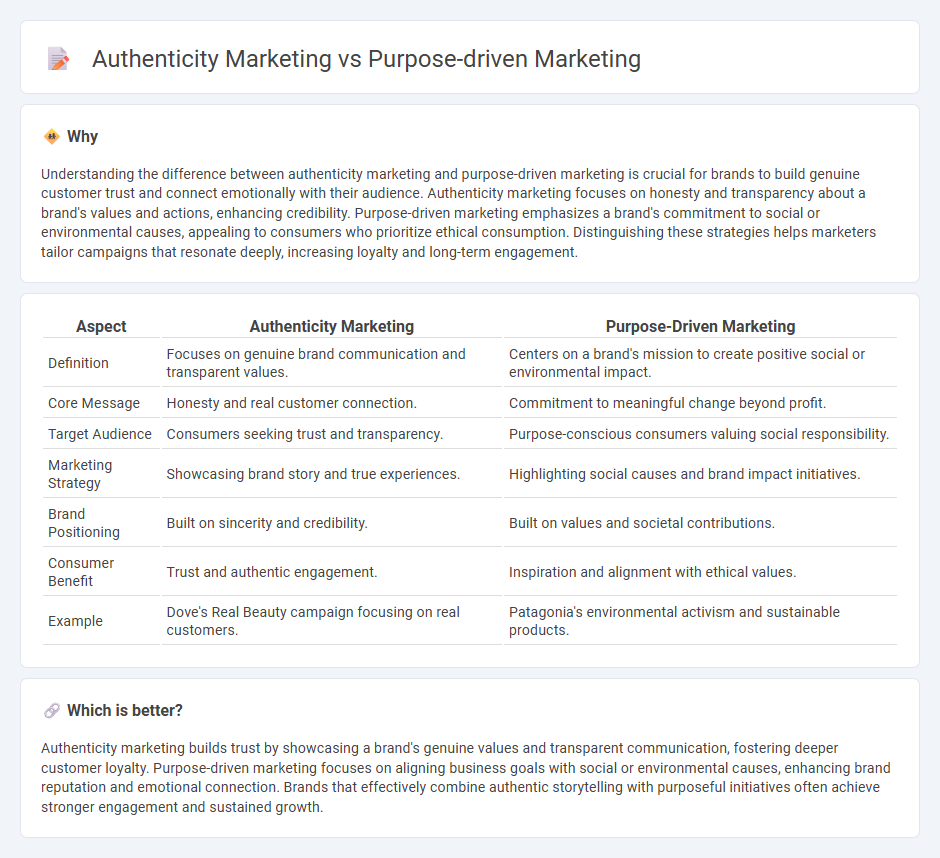
Authenticity marketing emphasizes genuine brand messaging and transparency to build trust with consumers, while purpose-driven marketing aligns a brand's values with a social or environmental cause to inspire customer loyalty and engagement. Both strategies leverage emotional connections but differ in focus: authenticity centers on honesty and real experiences, whereas purpose-driven marketing highlights meaningful impact. Explore how these approaches can transform your brand's marketing strategy.
Why it is important
Understanding the difference between authenticity marketing and purpose-driven marketing is crucial for brands to build genuine customer trust and connect emotionally with their audience. Authenticity marketing focuses on honesty and transparency about a brand's values and actions, enhancing credibility. Purpose-driven marketing emphasizes a brand's commitment to social or environmental causes, appealing to consumers who prioritize ethical consumption. Distinguishing these strategies helps marketers tailor campaigns that resonate deeply, increasing loyalty and long-term engagement.
Comparison Table
| Aspect | Authenticity Marketing | Purpose-Driven Marketing |
|---|---|---|
| Definition | Focuses on genuine brand communication and transparent values. | Centers on a brand's mission to create positive social or environmental impact. |
| Core Message | Honesty and real customer connection. | Commitment to meaningful change beyond profit. |
| Target Audience | Consumers seeking trust and transparency. | Purpose-conscious consumers valuing social responsibility. |
| Marketing Strategy | Showcasing brand story and true experiences. | Highlighting social causes and brand impact initiatives. |
| Brand Positioning | Built on sincerity and credibility. | Built on values and societal contributions. |
| Consumer Benefit | Trust and authentic engagement. | Inspiration and alignment with ethical values. |
| Example | Dove's Real Beauty campaign focusing on real customers. | Patagonia's environmental activism and sustainable products. |
Which is better?
Authenticity marketing builds trust by showcasing a brand's genuine values and transparent communication, fostering deeper customer loyalty. Purpose-driven marketing focuses on aligning business goals with social or environmental causes, enhancing brand reputation and emotional connection. Brands that effectively combine authentic storytelling with purposeful initiatives often achieve stronger engagement and sustained growth.
Connection
Authenticity marketing fosters genuine brand-consumer relationships by emphasizing transparency and real values, which aligns with purpose-driven marketing's focus on meaningful social or environmental impact. Both strategies prioritize conveying the brand's true mission and commitments, leading to enhanced trust and loyalty among target audiences. Integrating authenticity with purpose-driven marketing results in more compelling campaigns that resonate deeply with consumer values and drive long-term engagement.
Key Terms
**Purpose-driven marketing:**
Purpose-driven marketing centers on aligning a brand's mission with social and environmental causes to foster consumer trust and loyalty. This strategy emphasizes measurable impact, corporate responsibility, and communicating values that resonate deeply with target audiences. Explore how purpose-driven marketing can transform brand perception and drive meaningful engagement.
Social Impact
Purpose-driven marketing emphasizes aligning brand values with social causes to create meaningful change and resonate emotionally with consumers. Authenticity marketing centers on genuine communication and transparent practices to build trust and long-term loyalty through consistent social impact efforts. Explore how integrating both strategies can enhance your brand's influence and consumer connection.
Brand Mission
Purpose-driven marketing centers on aligning brand messaging with societal or environmental goals, creating a strong emotional connection with consumers who share similar values. Authenticity marketing emphasizes genuine, transparent communication that reflects the brand's true identity and practices, fostering trust and loyalty. Explore more about how these strategies impact brand mission effectiveness and consumer engagement.
Source and External Links
Purpose-Driven Marketing: How to Build a Brand that Matters - Purpose-driven marketing aligns a brand's mission and marketing activities with a meaningful social or environmental cause to create a deeper connection and stronger loyalty with consumers.
The Rise of Purpose-Driven Marketing - Korn Ferry - The goal of purpose-driven marketing is to build a deeper rapport with consumers by centering communications around social causes aligned with brand values, meeting evolving consumer expectations.
What are Purpose-Driven Marketing Campaigns? 5 Examples - Purpose-driven marketing campaigns strategically align messaging and resources with social or environmental causes, emphasizing a brand's commitment to positive societal impact beyond product promotion.
 dowidth.com
dowidth.com